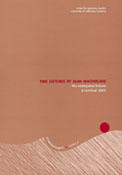Maruyama Lectures Occasional Papers
- Introduction
- Two Lectures by Kenzaburo Oe, April 1999
- Two Lectures by Tetsuo Najita, April 2000
- Two Lectures by John Dunn, April 2001
- Two Lectures by Carol Gluck, April 2004
- Two Lectures by Alan Macfarlane, October 2005
Two Lectures by Alan Macfarlane, October 2005
Lecture: Fukuzawa Yukichi and Maruyama Masao: Two Visions of Japan
Renowned British anthropologist and historian Alan Macfarlane considers the significance of Fukuzawa Yukichi and Maruyama Masao, whose common struggles with the implications of Western modernity made them "arguably the most interesting Japanese intellectuals of the last two hundred years." Both men recognized the deep institutional and historical foundations of Western political culture, and the challenges of introducing Western political values to a society organized along radically different lines. Macfarlane seeks to fill in the gaps between the two world views offered by Fukuzawa and Maruyama through his own provocative anthropological analysis, arguing that Japan's troubled relationship with modernity arises in part out of its apparent impermeability to its effects. It has escaped the "dissociations of modernity", and as a result, "nothing is split apart. Mind and body are on one continuum, part of the same entity, not separate as in the modern West."
Seminar: Fukuzawa and Maruyama: How to Understand Japan
Macfarlane expands upon his own evolving views on Japan, and how the Western anthropological tradition has often failed to comprehend a Japanese society in which "everything is situational, relational, symbolically linked to something else." Rejecting efforts to reduce Japan to the conventional units and structures of Western social science, Macfarlane argues instead that Fukuzawa and Maruyama's writings remain some of the best guides for understanding the deep complexities and ironies of "modern Japan."

